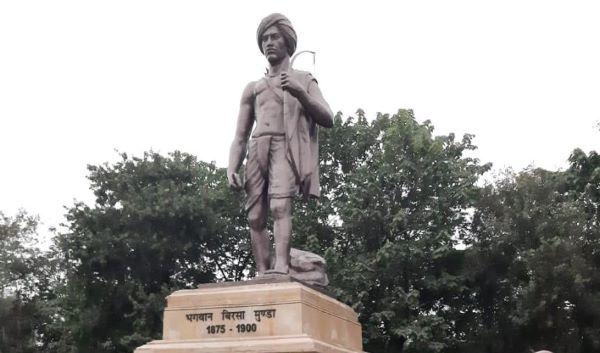
R Krishna Das
While the Nation celebrates Janajati Gaurav Diwas to mark Bhagwan Birsa Munda’s birth anniversary, his contribution in exposing the missionary’s mission and fraud cannot be overlooked.
The story is one of the most iconic in the history. Birsa was baptized and raised as “Birsa David” by Christian missionaries. But he soon realised that in the name of social services, the Church was on to a big mission of fraud. But he revolted against the Church and went back to his original belief system and sacrificed his life for self-respect.
His short life of just 25 years was dedicated to the realization about missionary fraud, social exploitation and illegal foreign occupation that offered current generation of youth to learn from his struggle.
Born in an extremely poor family yet rich within the family tradition on November 15, 1875 in Bamba, a suburb of Ranchi, Birsa was an intelligent, sharp and inquisitive child. He went to school at Salga, run by one Jaipal Nag. There he came in contact with a preacher who visited a few families in the village that had been converted to Christianity. As he was sharp in studies, Jaipal Nag recommended him to join German Mission School in Burj, Chaibasa.
The school authorities forced Birsa to change religious since converting to Christianity was obligatory to join the school. Birsa became a Christian respite having reservation and was renamed Birsa David, which later became as Birsa Daud. One day while the class was going as usual in the German Mission School, a teacher Dr Nottrott repeatedly used disparaging words for the Mundas. Birsa returned the favor by criticizing Dr. Nottrott and the missionaries in razor-sharp words eventually leaving the school in protest.
Soon after leaving school, Birsa and his family left Chaibasa and gave up their membership of the German mission. As an adolescent, Birsa heard tales of the Munda uprisings (ulgulaan) of the past and the Sardars (leaders) of the community urging the people to revolt. The Sardars talked of a golden age when the Mundas were free from oppression and foretold a time when the ancestral right of the community would be restored.
As maturity grew, Birsa Munda perceived the religious perversion and sinister design of Church in the Tribal belt of Bihar and Orissa. He could see the rampant conversion and religious exploitation being committed on to the innocent tribal. In 1895, at 20 years of age, Birsa Munda realized, if the tribal society had to be saved, Missionary church shackles had to be broken.
Chalakkad village in Tamar block was witness to Bhagwan Birsa Munda’s clarion call where he not only renounced Christianity but also exhorted his tribesmen to do the same. Tribal society cutting across the region responded with alacrity and reconversion to Tribal faith spread at an electrifying speed. The rise of Birsa Munda and his column of faithful tribals baffled the church. Besides weakening the social order of tribal life, Church was also involved in collecting exploitative taxes and usurping land in those regions. On Church’s conspiracy, Birsa Munda was arrested and was jailed for two years.
On 28 January 1898, after his release from Jail, Birsa Munda evolved into an even more determined and combative Incarnation. He started aggressively pursuing his endeavor to enlighten the tribal society from the evils of missionary. He was now a messenger of God and preacher into the remotest of Singhbhum district. Contemporary folk songs commemorating his effort, humility and personality were spreading like wildfire. He was now known as Dharti Aba, i.e. the father of land. He started a movement to claim the usurped temple of Kols tribes from missionaries at Singhbhum.
In such a short time, he could propel Mundas, Orasons, Kols, Kharias to follow the tribal belief and shun the Christianity. Alarmed at the expanding influences of Birsa Munda, The Christian missionaries conspired to arrest him. Sensing the conspiracy, Birsa Munda now astute enough to silently slip into the south in Orissa on a concealed trip. He spent some time among the tribal society of Coastal Orissa and stayed at the famous temple of Lord Jagannath Jee.
In 1899, he returned and declared himself to be the Messenger of Tribal faith and proclaimed the termination of Victoria Raj. The Raiyats (Tenant) were asked to refuse to pay any taxes and he presided over the new self-rule called Munda Raj in the tribal belt of Munda belt of Khunti, Tamar, Sarwada and Bandgaon.
Birsa Munda proclaimed a revolution to set free the Tribal land and people from Christian missionaries. Nearly 7000 armed tribals with Bow and arrow assembled at Ranchi and proceeded to confiscate the notorious and exploitative missionary. The two were on target, one at the Anglican Mission at Murhu and another at the Roman Catholic Mission at Sarwada. Alarmed at the mobilization, British came running for the rescue of the church.
The Birsa Munda fought a guerrilla war for the next two years. In the ensuing pitched battle, Birsa kept attacking British administrative installations. Unable to collect taxes and convert the Tribals into Christianity, The British attacked Birsa at Jamkopai near Chakradharpur. It was February 3, 1900, surrounded from all sides, Birsa led the last battle. The tribal fought bravely but with depleted ammunition and no supply line, they had to surrender. 63 Tribal were convicted and sent for long to life sentences. Birsa Munda was tortured and murdered in jail custody on 9th June 1900.
He attained martyrdom fighting for the cause of Tribal life for religious sanctity from missionary Church and administrative purity from British Empire.



